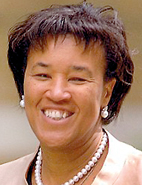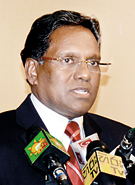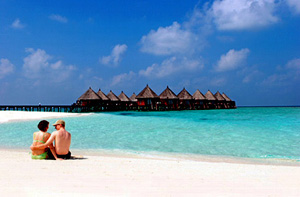Columns
Maldives Commission Report – will it bring calm or storm?
It was just a week ago that Maldivian President Dr. Mohamed Waheed was in Colombo, meeting diplomats, businesspeople and the media on a mission to strengthen the existing friendly relations between Sri Lanka and the Maldives. The visit came just days ahead of the release of a report by a commission appointed to investigate the controversial circumstances in which he, as deputy to former president Mohamed Nasheed, assumed office as President of the Maldives in February.
This was Waheed’s first state visit to Sri Lanka. In May he visited India, where he met Prime Minister Manmohan Singh and other top officials. He is now scheduled to leave on an official visit China. Nasheed too has made visits to Delhi and Colombo this year. It is of more than passing interest that the Maldives’ former dictator Maumoon Gayoom too visited Sri Lanka in April. He too is due to visit Delhi soon and hopes to meet Prime Minister Singh according to Indian media.
The travel destinations of the Maldivian political leaders (past and present) point to their keen awareness of the geostrategic imperatives in the region. For the small Indian Ocean archipelago these considerations dictate that the support and goodwill of its close South Asian neighbours need to be maintained, whilst simultaneously fostering good relations with China.
President Waheed when he visited in May sought to reassure Delhi that “China will not replace India.” But the Maldives, just like others, wants to develop trade links with the economic powerhouse.
The Maldivian economy depends heavily on tourism, and China has been the source of the largest number of tourists – reportedly 200,000 this year alone. The relative significance of the figure is apparent when one considers that the total population of the Maldives is less than 400,000.
As the regional hegemon, India has been ever watchful of the upheavals in the Maldives and has been close at hand throughout this troubled phase in the development of the fledgling democracy. Indian Foreign Secretary Ranjan Mathai visited Male as early as February, and some reports have described Delhi’s role in the crisis as that of a ‘facilitator.’
It is against the backdrop of this geopolitical landscape that the Maldives’ Commission of National Inquiry (CoNI) has released its report on the events leading to the transfer of power that took place in February. The Commission concluded that there had been no ‘coup’ as alleged, and that Nasheed’s resignation was brought about by his own actions, not under duress. Outraged supporters of the former president and his Maldivian Democratic Party (MDP) again took to the streets in protest, rejecting the report and calling for early elections. But Nasheed’s subsequent statement to the media that he accepts the report “with Ahmed Saeed’s reservations,” creates some ambiguity over the MDP’s stance.
Saeed who was Nasheed’s nominee to the Commisssion, resigned the day before the report’s release, protesting that the draft had significant omissions in relation to evidence.
President Waheed asserts that with the report’s verdict delivered, there can no longer be questions about the legitimacy of his government. He was elected as Vice President in 2008 when Nasheed became the first democratically elected president of the Maldives. Waheed says his mandate commenced from that date. Now with the findings of the report in his favour he would appear to be on terra firma since the Maldivian constitution provides for the Vice President to take over in the event the President is unable to perform his duties.
Waheed said in Colombo that there is no room to question the ‘independence and integrity’ of the Commission, after the original three member panel nominated by him was augmented to include a nominee of the Commonwealth, a retired Singaporean judge, as co-chair, and a nominee of Nasheed.
The Commission’s terms of reference had also been revised. Waheed has launched all-party talks to chart the course towards elections next year, which the MDP has welcomed. But he maintains that elections cannot take place before July 2013 which he says is the earliest date permitted by the constitution.
Nasheed earlier alleged that former dictator Gayoom was behind the agitation leading to his overthrow, and that Waheed is being used by him to stage a come-back. Confronted with this allegation by the media during his visit to India, Waheed vehemently denied that he was ‘a lackey’ of Gayoom. The Progressive Party of the Maldives (PPM) led by Gayoom is part of the government coalition, he says, and holds three cabinet posts out of 16.
But it is hard to ignore Gayoom’s footprints that appear across the terrain of the current Maldivian crisis. The autocrat who ruled for 30 years returned to the Maldives a month after Nasheed’s exit. His party is believed to have been a major player in the anti-government protests leading up to Nasheed’s resignation. It turns out that some key positions in the present administration are held by his children and loyalists. The following list gives an indication of the indirect influence he wields:
Dunya Maumoon – Minister of State for Foreign Affairs (Gayoom’s daughter)
Ghassan Maumoon- Minister of State for Human Resources (Gayoom’s son)
Abdul Samad Abdulla – Minister of Foreign Affairs (PPM member)
Abdulla Jihad – Minister of Finance and Treasury (Gayoom’s former Finance Minister)
Mohamed Waheed Deen – Vice President (Gayoom’s former Attorney General)
Azima Shakooru – Attorney General (former Attorney General under Gayoom in 2007)
Mohamed Husain Sharif Mundu – Minister of Youth Affairs (PPM Spokesperson)
Ismail Shafeeu – CoNI co-chair (Gayoom’s former Minister of Defence and National Security)
Ahmed Mujuthaba – Mediator in all-party talks (Gayoom’s former Minister of Tourism)
(Sources: SA Global Affairs, Minivan News)
The UN and Commonwealth have welcomed the CoNI report and urged all parties to ‘move forward.’ But uncertainties remain as to whether the conclusion of the investigation will bring an end to the political turmoil that has haunted the Maldives throughout this year. On the positive side, it may be seen that in spite of the unsettled situation, so far the parties to the conflict have shown a commendable ability to compromise.
Waheed seems open to accommodating the MDP in the government, and Nasheed is participating in the all party talks. It may also be noted that in spite of a breakdown in law and order during the events of February 6-7, not a single death was reported during the confrontations.
Caught up as they are in the strategic cross currents of the Indian Ocean region, one can only hope that the people of the Maldives will be spared the problems that can be caused by interference of big powers, so that they may resolve their difference peacefully and democratically.
Follow @timesonlinelk
comments powered by Disqus




















